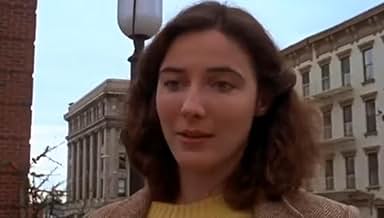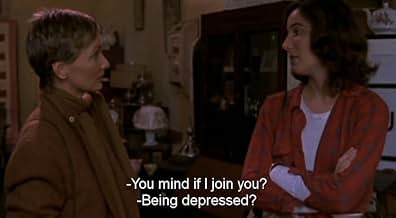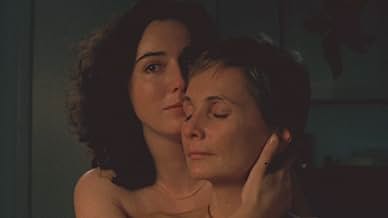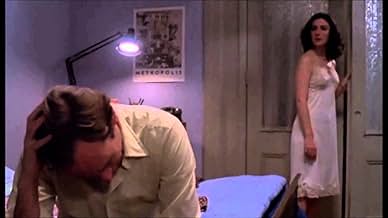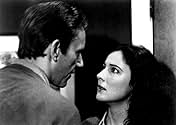IMDb-BEWERTUNG
6,8/10
1894
IHRE BEWERTUNG
Eine glücklich verheiratete Frau wird sich nach einer Affäre mit einer Hochschulprofessorin bewusst, dass sie eine unterdrückte Lesbe ist, und versucht dann, sich mit ihrem neu gefundenen Le... Alles lesenEine glücklich verheiratete Frau wird sich nach einer Affäre mit einer Hochschulprofessorin bewusst, dass sie eine unterdrückte Lesbe ist, und versucht dann, sich mit ihrem neu gefundenen Lebensstil abzufinden.Eine glücklich verheiratete Frau wird sich nach einer Affäre mit einer Hochschulprofessorin bewusst, dass sie eine unterdrückte Lesbe ist, und versucht dann, sich mit ihrem neu gefundenen Lebensstil abzufinden.
Jessica MacDonald
- Theda
- (as Jessica Wight MacDonald)
Empfohlene Bewertungen
Lianna (Rachel Griffiths) is unhappily married to a cheating husband (John De Vries) and has two children. She falls for a female teacher (Jane Hallaren) and realizes she's a lesbian. She starts an affair with her and realizes she can't stay with her husband...she must find her own identity as a lesbian.
It's hard to believe this was made in 1983. Definitely a ground breaker. I remember it played forever in a small art house cinema in Cambridge MA. I didn't see it back then but I'm glad I got the chance. BTW, it was beautifully restored in 2003 and that's the print I saw. John Sayles wrote and directed the film and, like all his films, it has incredible dialogue and a believable script. This is probably the first realistic film to show a woman coming to grips with her sexual orientation--and embracing it completely. It does show the hardships she goes through adjusting to a life on her own and the relationship problems--but that's very true to life. The trip to a lesbian bar was surprising in a film this old. The acting by the leads is superb--Griffiths is perfect and Hallaren matches her. De Vries is good also but he's stuck with a 1 dimensional villain role. The supporting roles are somewhat amateurish--but they don't lessen the film. In fact it makes it seem even more realistic! The sex scenes are explicit but tasteful.
It's hard to believe a man wrote and directed such a sensitive portrayal of a woman. My only complaint is that it's a bit overlong--but this still should be seen. A groundbreaking and very honest film. An 8 all the way.
It's hard to believe this was made in 1983. Definitely a ground breaker. I remember it played forever in a small art house cinema in Cambridge MA. I didn't see it back then but I'm glad I got the chance. BTW, it was beautifully restored in 2003 and that's the print I saw. John Sayles wrote and directed the film and, like all his films, it has incredible dialogue and a believable script. This is probably the first realistic film to show a woman coming to grips with her sexual orientation--and embracing it completely. It does show the hardships she goes through adjusting to a life on her own and the relationship problems--but that's very true to life. The trip to a lesbian bar was surprising in a film this old. The acting by the leads is superb--Griffiths is perfect and Hallaren matches her. De Vries is good also but he's stuck with a 1 dimensional villain role. The supporting roles are somewhat amateurish--but they don't lessen the film. In fact it makes it seem even more realistic! The sex scenes are explicit but tasteful.
It's hard to believe a man wrote and directed such a sensitive portrayal of a woman. My only complaint is that it's a bit overlong--but this still should be seen. A groundbreaking and very honest film. An 8 all the way.
A very interesting film and certainly a good example of John Sayles work. He wrote, directed and played the male lead in the film. Sayles, who wrote Lone Star, Silver City and Passion Fish among many others, is much better in writing and directing than acting, but he certainly portrays an asshole husband in a loveless marriage well.
Linda Griffiths, in her first film, gave an incredibly touching performance as a woman who realizes that she is a lesbian after having two children. She goes through the emotions as she realizes the first person she ever loved is leaving her for an old girlfriend; she deals with the loss of her family; and she stumbles through as friends don't quite know how to deal with her.
Anytime a marriage breaks up it is hard, but I believe it is doubly hard in this situation and this film really gives a good picture of what all have to go through.
Linda Griffiths, in her first film, gave an incredibly touching performance as a woman who realizes that she is a lesbian after having two children. She goes through the emotions as she realizes the first person she ever loved is leaving her for an old girlfriend; she deals with the loss of her family; and she stumbles through as friends don't quite know how to deal with her.
Anytime a marriage breaks up it is hard, but I believe it is doubly hard in this situation and this film really gives a good picture of what all have to go through.
Linda Griffiths ('Overdrawn at the Memory Bank') plays the title character, a wife & mom unhappily married to unfaithful film professor Dick (Jon DeVries, "American Gangster"). She's long suppressed what turn out to be lesbian tendencies, only fully accepting this once she embarks upon a relationship with Ruth (Jane Hallaren, "Body Heat"), her child psychology professor. Naturally, this causes various problems in her formerly staid existence.
Writer / director / editor and indie favorite John Sayles was ahead of the curve here in his effort to tell a mature story of a lesbian romance, and his script is notably intelligent and compassionate. As always, he has a great ear for dialogue, and there are some very funny lines along the way. (Per his style, he gives himself an amusing supporting role as the character Jerry.) Moreover, the whole story is *believable*, and the characters come off as real, multi-dimensional people.
This little film is well cast right down the line, even if much of the cast are not exactly big names. Griffiths & Hallaren are wonderful in the leads, and Jo Henderson ('Search for Tomorrow') is likewise engaging as Liannas' good friend Sandy, who admits to being uncomfortable about Liannas' coming out, but who still intends to be the best friend that she can be. A young Chris Elliott ('Get a Life') made his film debut here, in a small role as a lighting technician.
Ultimately a sensitive tale of one womans' journey towards self-discovery, "Lianna" is one of those pictures that discerning viewers can't afford to miss.
Eight out of 10.
Writer / director / editor and indie favorite John Sayles was ahead of the curve here in his effort to tell a mature story of a lesbian romance, and his script is notably intelligent and compassionate. As always, he has a great ear for dialogue, and there are some very funny lines along the way. (Per his style, he gives himself an amusing supporting role as the character Jerry.) Moreover, the whole story is *believable*, and the characters come off as real, multi-dimensional people.
This little film is well cast right down the line, even if much of the cast are not exactly big names. Griffiths & Hallaren are wonderful in the leads, and Jo Henderson ('Search for Tomorrow') is likewise engaging as Liannas' good friend Sandy, who admits to being uncomfortable about Liannas' coming out, but who still intends to be the best friend that she can be. A young Chris Elliott ('Get a Life') made his film debut here, in a small role as a lighting technician.
Ultimately a sensitive tale of one womans' journey towards self-discovery, "Lianna" is one of those pictures that discerning viewers can't afford to miss.
Eight out of 10.
10bj_lucky
John Sayles' ability to get you acquainted with his characters shines again in this study of a wife and mother who is coming to terms with her sexuality. Unlike the tawdry stories that focus solely on the sexual aspect of lesbian relationships, Sayles explores and reveals the complexity of discovering homosexual orientation - what it means to Lianna as her sexuality emerges from repression and what it means to her and others that she chooses to live truthfully with it.
There are some very rare vignettes in this film that bely what it is like to discover the attractiveness of women for the first time. Sayles does such a masterful job at portraying this process of discovery - it is joyful, playful, and exciting. These scenes remind me of Truffaut's "The Man Who Loved Women" (also badly remade in the USA, starring Burt Reynolds), but they seem to have a more natural depth and feel. Sayles' movies are typically populated with real characters, not posing movie stars. This film is true Sayles...so much is at stake for Lianna, and you are drawn into the aspects and dimensions of her life, the complexities and facets of the human sexual nature and of life in general, and what it means to come to terms with being gay.
There are some very rare vignettes in this film that bely what it is like to discover the attractiveness of women for the first time. Sayles does such a masterful job at portraying this process of discovery - it is joyful, playful, and exciting. These scenes remind me of Truffaut's "The Man Who Loved Women" (also badly remade in the USA, starring Burt Reynolds), but they seem to have a more natural depth and feel. Sayles' movies are typically populated with real characters, not posing movie stars. This film is true Sayles...so much is at stake for Lianna, and you are drawn into the aspects and dimensions of her life, the complexities and facets of the human sexual nature and of life in general, and what it means to come to terms with being gay.
A woman develops romantic feelings for her (female) child psychology professor. A love affair ensues, and Lianna's life is transformed.
John Sayles' film is an attractive, well-made piece, perceptively analysing character and relationships in the claustrophobic atmosphere of a small-town college campus. The location looks like upstate New York (Sayles is a native of Schenectady).
Lianna Massey is in her 30's and she has allowed life to happen to her. As a college student she drifted into a relationship with her teacher, Dick. Now she is married to him and they have two children. We see her doing the dull rounds, picking up the kids and waiting at the back of Dick's class to give him a ride home. Alone after the students leave, Lianna and Dick do not embrace. This is a loveless marriage. When Dick complains about Lianna entering his class, she hits back with, "Afraid you'll let them see you playing husband?" We now have Dick's measure. He is a philanderer who preys on undergraduates for sex.
Dick has exploited Lianna's passivity, shaping the marriage to his own advantage. Even the children are named after his favourite movie stars (Dick lectures in Film Studies). He attends campus parties alone, reasoning that he has to be seen at these functions if he is to get tenure. In fact, he is busy chasing student skirt. When Lianna shows up at one party unannounced and sees him romping in the sand box, her last bond of loyalty towards him is severed.
Ruth Brennan is an impressive woman. In her late 40's and a professor of Child Psychology, she is bright, good-looking and stylish, with plenty of wisdom and poise. She teaches an evening class for campus moms, and this is where Lianna meets her. Drawn to the urbane, understanding Ruth, Lianna makes clumsy attempts to ingratiate herself, offering to work as a research assistant and compiling lists of children's literature. While Dick is out of town attending the Toronto Film Festival, Lianna takes the opportunity to have dinner at Ruth's place.
Ruth is an experienced lesbian, but Lianna is not yet even aware that this is where the friendship is heading. As she prepares for the dinner date, we see Lianna decide, on a whim, to go bra-less. Her feelings are as yet inchoate, but we know that the relationship is about to become sexual.
The two women become lovers, but things do not work out as cosily as the naive Lianna had expected. She burns her boats with Dick, who shows that his hard intellect is coupled with a phenomenal mean streak. Lianna's friend Sandy, uncomprehendingly conventional in her outlook, rejects her. Even more ominously, Ruth proves to be an aloof, calculating lover. Lianna is dismayed to find that she can't move in with Ruth, because it would cause a scandal "here in faculty land". Suddenly Lianna is confronted with the stark reality of her new situation: her children stay with Dick while she has to find herself a job and a place to live. Ruth ends the research assistant arrangement, saying that it is inappropriate for a bed partner to be an employee. She asks Lianna not to call her by her first name in class. Worse still, Lianna learns of "the woman back home", Ruth's long-standing lover, who is still very much on the scene.
As the affair with Ruth fades and withers, Lianna has to feel her way painfully towards a new life for herself. We see her alone in her empty apartment, the plaintive whistle of the kettle representing the dull ache of her unhappiness. She has to cope with a dead-end job and brainless colleagues, having forsaken the easy life of a faculty mom and the sparkling wit of campus society. Her TV set becomes her life, the lame soap opera dialogue echoing her words to Ruth. The girl in the launderette is reading "The Well Of Loneliness". Lianna's meetings with her children are agonising for all concerned. Jerry the campus stud (played by Sayles) calls on the company-starved Lianna. She is delighted to see him until she realises that he is a shark, trying to exploit her vulnerability. When he is rebuffed, Jerry (typically) misses the point and rationalises it in self-referential terms: "My technique must be getting ragged."
Early on in the affair, Ruth had taken Lianna to a gay bar. The 'naughtiness' and the excitement of it had been a liberating experience for the Alberta girl. Now, she heads back to the bar merely to slough off her loneliness. When she ends up in bed with Cindy of the Women's Air Corps, Cindy points out that the two of them have little in common. "We have enough," replies Lianna bleakly.
There are plenty of strikingly clever moments in this impressive film. Sayles' crash-edited blackboard trick is memorable. Later, students try to film a drinks party, and Sayles comments ironically on their attempt by shooting the scene with a handheld camera. The dance show which Lianna stage-manages is a neat dramatisation of her predicament, and the beautiful Otis Redding music entirely apposite. The children are shown brilliantly to be 'in the middle' of the marriage breakdown as they sit on the sofa, eyes darting back and forth between mom and dad, like tennis spectators.
The telephone is used cleverly to symbolise communication breakdown. Dick slams the receiver down, signifying the death of the marriage, and Lianna fails to get any answers as she phones out from her beleaguered apartment.
John Sayles' film is an attractive, well-made piece, perceptively analysing character and relationships in the claustrophobic atmosphere of a small-town college campus. The location looks like upstate New York (Sayles is a native of Schenectady).
Lianna Massey is in her 30's and she has allowed life to happen to her. As a college student she drifted into a relationship with her teacher, Dick. Now she is married to him and they have two children. We see her doing the dull rounds, picking up the kids and waiting at the back of Dick's class to give him a ride home. Alone after the students leave, Lianna and Dick do not embrace. This is a loveless marriage. When Dick complains about Lianna entering his class, she hits back with, "Afraid you'll let them see you playing husband?" We now have Dick's measure. He is a philanderer who preys on undergraduates for sex.
Dick has exploited Lianna's passivity, shaping the marriage to his own advantage. Even the children are named after his favourite movie stars (Dick lectures in Film Studies). He attends campus parties alone, reasoning that he has to be seen at these functions if he is to get tenure. In fact, he is busy chasing student skirt. When Lianna shows up at one party unannounced and sees him romping in the sand box, her last bond of loyalty towards him is severed.
Ruth Brennan is an impressive woman. In her late 40's and a professor of Child Psychology, she is bright, good-looking and stylish, with plenty of wisdom and poise. She teaches an evening class for campus moms, and this is where Lianna meets her. Drawn to the urbane, understanding Ruth, Lianna makes clumsy attempts to ingratiate herself, offering to work as a research assistant and compiling lists of children's literature. While Dick is out of town attending the Toronto Film Festival, Lianna takes the opportunity to have dinner at Ruth's place.
Ruth is an experienced lesbian, but Lianna is not yet even aware that this is where the friendship is heading. As she prepares for the dinner date, we see Lianna decide, on a whim, to go bra-less. Her feelings are as yet inchoate, but we know that the relationship is about to become sexual.
The two women become lovers, but things do not work out as cosily as the naive Lianna had expected. She burns her boats with Dick, who shows that his hard intellect is coupled with a phenomenal mean streak. Lianna's friend Sandy, uncomprehendingly conventional in her outlook, rejects her. Even more ominously, Ruth proves to be an aloof, calculating lover. Lianna is dismayed to find that she can't move in with Ruth, because it would cause a scandal "here in faculty land". Suddenly Lianna is confronted with the stark reality of her new situation: her children stay with Dick while she has to find herself a job and a place to live. Ruth ends the research assistant arrangement, saying that it is inappropriate for a bed partner to be an employee. She asks Lianna not to call her by her first name in class. Worse still, Lianna learns of "the woman back home", Ruth's long-standing lover, who is still very much on the scene.
As the affair with Ruth fades and withers, Lianna has to feel her way painfully towards a new life for herself. We see her alone in her empty apartment, the plaintive whistle of the kettle representing the dull ache of her unhappiness. She has to cope with a dead-end job and brainless colleagues, having forsaken the easy life of a faculty mom and the sparkling wit of campus society. Her TV set becomes her life, the lame soap opera dialogue echoing her words to Ruth. The girl in the launderette is reading "The Well Of Loneliness". Lianna's meetings with her children are agonising for all concerned. Jerry the campus stud (played by Sayles) calls on the company-starved Lianna. She is delighted to see him until she realises that he is a shark, trying to exploit her vulnerability. When he is rebuffed, Jerry (typically) misses the point and rationalises it in self-referential terms: "My technique must be getting ragged."
Early on in the affair, Ruth had taken Lianna to a gay bar. The 'naughtiness' and the excitement of it had been a liberating experience for the Alberta girl. Now, she heads back to the bar merely to slough off her loneliness. When she ends up in bed with Cindy of the Women's Air Corps, Cindy points out that the two of them have little in common. "We have enough," replies Lianna bleakly.
There are plenty of strikingly clever moments in this impressive film. Sayles' crash-edited blackboard trick is memorable. Later, students try to film a drinks party, and Sayles comments ironically on their attempt by shooting the scene with a handheld camera. The dance show which Lianna stage-manages is a neat dramatisation of her predicament, and the beautiful Otis Redding music entirely apposite. The children are shown brilliantly to be 'in the middle' of the marriage breakdown as they sit on the sofa, eyes darting back and forth between mom and dad, like tennis spectators.
The telephone is used cleverly to symbolise communication breakdown. Dick slams the receiver down, signifying the death of the marriage, and Lianna fails to get any answers as she phones out from her beleaguered apartment.
Wusstest du schon
- WissenswertesJohn Sayles had written the screenplay for this film before writing the screenplay for his debut film, Return of the Secaucus Seven (1980). Sayles failed to get funding for a film about a lesbian love affair in the 1970s, and those who felt comfortable with the material were not comfortable with the film being directed by a man. So, Sayles put the Lianna (1983) screenplay on hold until gaining success with his two first films, Return of the Secaucus Seven (1980) and Baby, It's You (1983).
- Crazy CreditsThe opening credits credit only the production company and the crew members. The cast is not credited until the end credits. The title of the film, LIANNA, appears as the last title card after John Sayles is credited as writer, producer, director and editor.
- VerbindungenFeatured in Gefangen in der Traumfabrik (1995)
Top-Auswahl
Melde dich zum Bewerten an und greife auf die Watchlist für personalisierte Empfehlungen zu.
- How long is Lianna?Powered by Alexa
Details
Box Office
- Budget
- 300.000 $ (geschätzt)
- Bruttoertrag in den USA und Kanada
- 1.530.839 $
- Weltweiter Bruttoertrag
- 1.530.839 $
Zu dieser Seite beitragen
Bearbeitung vorschlagen oder fehlenden Inhalt hinzufügen



